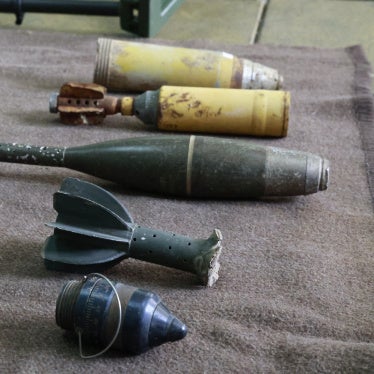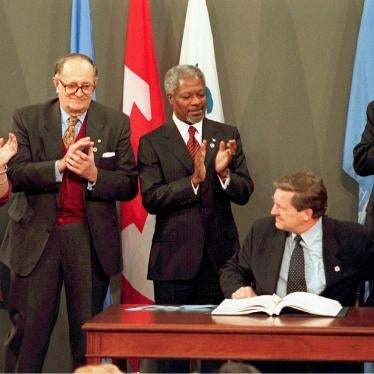1. Good morning. My name is Joost Hiltermann, and I am the executive director of the Arms Division of Human Rights Watch. I am here today because the arms trade is, to a large extent, an issue of human rights concern.
2. Established twenty years ago this year, Human Rights Watch monitors human rights around the world.
3. As part of its mandate, the organization has monitored the production, trade and use of weapons in violation of human rights and international humanitarian law (also known as the laws of war). This found its institutional expression in 1992 in the establishment of the Arms Division, with three goals:
- to pursue bans on weapons that are indiscriminate or cruel, like landmines, blinding lasers, and chemical and biological weapons.
- to seek to curb arms transfers to forces that abuse human rights, be they governments or non-state actors like paramilitaries and guerrillas.
- to promote transparency in arms sales.
4. From this basic position, we strongly support the decision by the G8 to place the issue of illicit arms trafficking on its agenda.
In our field research in Africa and elsewhere, we have discovered that abusive forces are often supplied by private arms traffickers that elude official controls to the extent that such controls exist.
In the case of the Great Lakes region in Africa, for example, which has been the scene of large-scale humanitarian disasters, including genocide, we have documented a steady inflow of weapons through private traffickers who use Europe and South Africa as headquarters and safe havens.
5. The measures that are currently being considered harmonization of export/import documentation, marking of firearms, exchange of information, etc. are all very good, and we support them.
6. Yet it will be important to clarify three points:
As a human rights organization, we cannot afford to place primary emphasis, as the G8 appear to be doing, on the use of firearms in crime. To us and to many NGOs involved with this issue, the primary focus should be on the use of small arms and light weapons generally in armed conflict.
Most serious abuses in post-Cold War conflicts have been committed with precisely these kinds of weapons, which have made conflicts more protracted and lethal, and have emboldened abusive actors and thereby encouraged a climate of impunity.
Unprotested arms supplies to Rwanda in the period leading up to the 1994 genocide, for example, are certain to have provided the perpetrators of the genocide not only with arms but also with a sense of invincibility and impunity.
While it is a good idea to tackle the illicit trade in weapons, we must look at the private arms trade as such, and make sure that arms traders are not receiving licenses for the sale of weapons to known human rights abusers.
Governments have a responsibility to make sure that these kinds of sales are not permitted. It would be all too easy otherwise for governments to covertly supply arms to abusive forces, all the while hiding behind the excuse of a private trade gone wild.
This ties in to my third point: In addition to the private trade, the G8 should also work toward a strict and binding international code of conduct that will prevent the transfer of weapons by states to other states or to non-state actors that are engaged in serious abuses of human rights or international humanitarian law.
As we have seen in cases like Rwanda, serious abuses of human rights, including genocide, are committed not only by non-state actors, but by governments that have been supplied by other governments.
We have documented how various states provided weapons to Rwanda before and even during the genocide.
And in the case of Turkey, which has committed serious abuses of international humanitarian law in its fight with the Kurdish Workers Party in southeastern Turkey and northern Iraq, the United States has provided almost all of the weaponry with which these abuses have been committed.
7. Because it is mainly governments that supply weapons, overly or covertly, to clients that abuse human rights, and it is governments that fail to prohibit private arms sales to such clients, we believe that governments, including the United States, have a moral responsibility to address the problem of illicit arms trafficking in the wider context of the arms trade generally.
So with these three important caveats in mind, Human Rights Watch wholeheartedly endorses the G8's announced intent to tackle the illicit trade in firearms at its summit in Birmingham next week.
Thank you.








